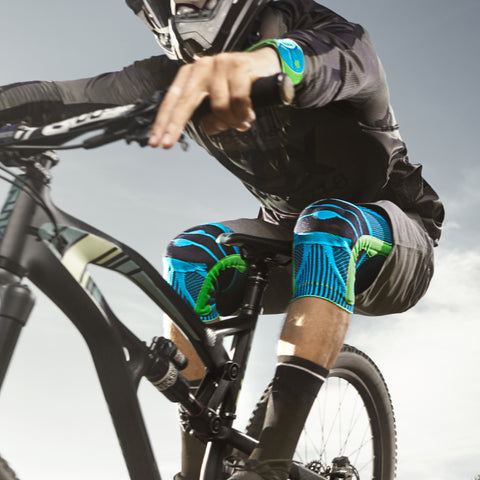The amount of physical stress our knees can withstand over a lifetime is nothing short of a miracle. Unfortunately, as the body ages, knee pain can become a daily problem. In this article, you will learn about how you can avoid knee pain and what to do if it has already occurred.
The knee joint is the most complex joint in our body. Logically, since it is a vital link between our thigh and lower leg, it has to work constantly, over decades, stretching, bending and helping to support weight. Stretching and bending are often accompanied by hereditary problems, and depending on lifestyle, frequency of exercise and type of sport, the knees endure continuous overload.
What to do to avoid knee pain?
- Training every day
- Engaging in road-friendly sports such as: swimming, cycling, walking
- If you need to carry heavy objects on a daily basis, do it properly, for example using a backpack.
- Relax your knee joints when possible – stretch your legs, especially after sitting for a long time.
- Avoid standing or sitting in one position for a long time.
- Choose orthopedically correctly designed shoes, or at least shoes with a soft part of the sole
- Avoid bending your knees during the load, the load will be less on the knee if you keep your leg straight
- Choose shoes without heels
- Watch your weight, excess weight significantly increases the load on the knees
- Trains leg muscles
Most people think about knee health and anatomy only when they feel the first pain. The knee joint is located where the thigh and lower leg bones meet. In the middle of these bones is the meniscus, which is made of cartilage discs - they fill the space in the joint. In front of these discs is the patella, which helps the thigh muscles to support the lower leg muscles. When standing, the cruciate ligaments guide and stabilize the knee joint. Cruciate ligaments, during movements, serve as a safety belt and during overload, the ligaments can tear.

Physically hard work and some sports are like poison for your knees
The tendons, ligaments and meniscus that perform the supporting functions of the knee joint are very sensitive and fragile, especially when they are overloaded on a daily basis. In some professions it is impossible to avoid it, for example – construction and gardening. In these professions, you often have to bend down, stay in a position with bent knees for a long time, not to mention the craziest part - lifting heavy objects.
People often have congenital knee problems, - X-shaped legs, abnormally shaped patella, luxation of the knee bone. Obesity is also a big risk for the knees, not only more weight that they have to bear, obesity also makes it difficult to do daily exercises. Exercising daily is very important for knee health, as it is the only way to strengthen the muscles, thus protecting the tendons, ligaments and meniscus.
But you have to be careful with sports and training, they also have a negative side. Cycling, walking and swimming are certainly healthy in moderation, but for example running, handball, basketball and the popular squash are among the sports that carry a high risk of joint and ligament injuries. There is also a very high risk of tearing or at least straining tendons in these sports. Few people realize that it is only in very rare cases that tendon injuries can be completely cured.
Never squat too low
Squats are a very popular exercise, it's important to do them correctly. Doing squats incorrectly can contribute to the wear and tear of joint cartilage. When doing squats, the thigh should not be at an angle of less than 45 degrees.
The first signs of knee problems are often knee "crunching" and pulling pains during movement. They can indicate the first symptoms that tell about cartilage and meniscus problems. Research data shows that 8.5 million German residents have encountered these symptoms.

Knee hurts, what to do?
If any of the following points apply to you, see a doctor:
- You feel pain in your knee for more than two days
- You feel knee pain even at rest
- You feel unsteady when walking or have limited knee movement
There are two very similar solutions available to alleviate knee pain: kinesiology taping or road support . Both of these solutions will loosen the ligaments and reduce pain. A knee support/orthosis will also provide stabilization of the neuromuscular system. Kinesiological taping is used more and more often in professional sports, it will help to quickly relieve pain in acute situations. It should be noted that the tape must be changed every 3-4 days and it is essential that the taping is done by a specialist. Supports/orthoses while they will be available to you in the long term and it is almost impossible to put them on incorrectly.
If you are in a high risk group due to your profession, sport or congenital problems. - pulling the support on a daily basis is recommended as soon as you feel the slightest pain or feeling of instability.

